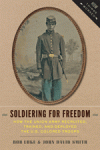By Robert J. Brugger
It will be a great pleasure to welcome members of the Society of Civil War Historians to Baltimore, scene of so many events leading up to the sectional conflict and such deep division during and after the war itself. William Lloyd Garrison stood trial here for supposedly defaming the character of a slave dealer. Frederick Douglass learned to read in Fells Point. Confederate sympathizers on Pratt Street, resisting the passage of Massachusetts troops, produced the first bloodshed of the war on the anniversary of Lexington and Concord, April 19, 1861. In the spring of the following year a pro-Union mob attacked a Southern-leaning social club at Franklin and Cathedral streets, enraged that, following the Battle of Front Royal, Confederate Marylanders reportedly had shot into the ambulances of Union Marylanders. After the Battle of Gettysburg, Union military authorities arrested males members of Baltimore families burying Confederate dead in local cemeteries.
As a high-school student in Hagerstown, I happily fell under the spell of Civil War history. I’ll not likely grow tired of reading it, and I’d like to think that books Johns Hopkins has published on the topic in the past two decades have owed something to that boyhood fascination. I’m of course proud of all of them, though I would point to the work of Margaret Humphreys as extremely important to the history of medicine during the war and wartime (and the history of medicine and surgery generally). Non-academic readers understandably await the next of Ron Coddington’s “Faces of” series with eager anticipation (the next will explore Union and Confederate sailors and marines). Michael Burlingame’s massive Abraham Lincoln may be the most enduring single title I have had any connection with at Johns Hopkins. As a Vietnam vet, I call special attention to Michael C. C. Adams’s compelling and sobering view of the war (that is, of war).
We continue to search for meritorious work in the era and have some exciting new Civil War and society books in development, among them Scott Hartwig’s reappraisal of the Battle of Antietam; an examination of Union engineering expertise; a fresh assessment of Lincoln’s war governors, the first since that of William B. Hesseltine in the late 1940s; a new look at the problem of military mobilization in major Union cities; and, an especially promising project, the prelude to war, the conflict itself, and its aftermath as a study in Southern generational experience.
SCWH Featured New and Bestselling Titles:
African American Faces of the Civil War: An Album, by Ronald S. Coddington
Secession Winter: When the Union Fell Apart, by Robert J. Cook, William L. Barney, Elizabeth R. Varon
To Antietam Creek: The Maryland Campaign of September 1862, by D. Scott Hartwig
Marrow of Tragedy: The Health Crisis of the American Civil War, by Margaret Humphreys
Soldiering for Freedom: How the Union Army Recruited, Trained, and Deployed the U.S. Colored Troops, by Bob Luke and John David Smith
Senior Acquisitions Editor Robert J. Brugger, PhD, acquires books in American History, American Studies, History of Technology, and regional topics for the JHU Press. In Baltimore, meet Bob and the Press at our space at the Sheraton Inner Harbor Hotel from June 12 to 14. Use the SCWH discount code HEYT to receive a 30% discount on all books featured in this blog post or mention this code when calling in your order at 1-800-537-5487. Check out the SCWH online; read more about the SCWH Biennial Meeting; and/or follow the JHU Press on Facebook and Twitter.








